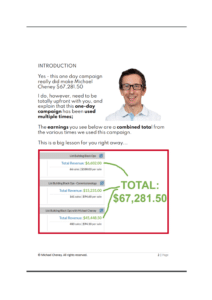As an affiliate marketer, you know the importance of staying on the right side of the law. Regulations around affiliate marketing are constantly evolving to keep up with changes in technology and business practises. Failure to comply can lead to penalties, loss of commissions, and damage to your reputation. However, keeping up with the latest guidelines and requirements from regulators, networks, and merchants can feel like a full-time job in itself.


If you’ve been struggling online this report will open your eyes.
Affiliate Marketing Regulations: An Overview
As an affiliate marketer, it’s crucial you understand the regulations around affiliate marketing to ensure your business practises are compliant and avoid costly fines. Let’s overview the major regulations and best practises you need to know:
The Federal Trade Commission (FTC) requires that you disclose any material connection with a product or service you’re promoting. This means clearly stating that you earn a commission for any sales or leads generated. The FTC also prohibits misleading ads and false product claims.
Always be transparent in your marketing and advertising. Disclose affiliate relationships and be honest in your messaging. Never make misleading or false statements about a product to increase commissions.
The CAN-SPAM Act sets rules for sending commercial emails, like affiliate marketing campaigns. Key rules: obtain consent before emailing, allow opt-outs, properly identify the message as an ad, and don’t mislead recipients.
Make sure you have consent before emailing subscribers and provide an easy opt-out method. Clearly identify any promotional messages as advertisements.
GDPR & Privacy Regulations
If you have affiliates or market to customers in the EU, you must comply with GDPR data privacy rules. This includes obtaining clear consent, allowing data access requests, and securing personal data.
Obtain explicit consent from EU subscribers before collecting or using their data. Provide an easy method for users to request their data or be forgotten. Take strong measures to protect any personal data you collect.
By understanding key regulations and following best practises around transparency, consent, and data privacy, you can build an affiliate marketing programme that fosters trust and long-term success. Stay up-to-date with laws as new regulations emerge to keep your programme fully compliant.

Become the Internet Marketing Millionaire’s Next Apprentice!!
Key Affiliate Marketing Compliance Considerations
To stay on the right side of affiliate marketing regulations, there are a few key considerations you’ll need to keep in mind.
Disclosure and Transparency
It’s important to be fully transparent about your affiliate relationships and disclose when you’re promoting a product you have an affiliate link for. Failing to do so can be seen as deceptive marketing by regulators. The best approach is to clearly state when a link is an affiliate link or when you may earn a commission for a product.
Accurate Representation
Don’t misrepresent what an offer or product can do just to make a sale. Only promote products and services you genuinely trust and would recommend to friends and family. Regulators crack down hard on misleading marketing and false claims.
Privacy and Data Use
How you collect and use customer data is tightly regulated. Make sure you have a privacy policy on your website and that you’re transparent about what data you’re collecting and how it’s used. Also, be very careful about sharing customer data with third parties. It’s best to avoid it altogether unless you have the customer’s explicit consent.
Restricted Products
Certain types of products like pharmaceuticals, firearms, tobacco, and alcoholic beverages have additional regulations around how they can be marketed and sold. Be aware of restrictions for any niche you operate in. When in doubt, avoid promoting those types of heavily regulated products altogether.
By focusing on principles of disclosure, accuracy, privacy protection and compliance, you’ll set yourself up to build an ethical affiliate marketing business that stands the test of time. While regulations may evolve, values like trust, transparency and integrity will always matter most to your audience and the regulators who protect them.

Affiliate Marketing Best Practises for 2023
To set yourself up for success as an affiliate marketer in 2023, there are a few best practises you should keep in mind.
Follow FTC Guidelines
The FTC requires that affiliates clearly disclose their relationship to merchants. Make sure any links or mentions of products you promote are accompanied by a disclosure like “I receive compensation for purchases made through links in this post”. The FTC regularly checks affiliate sites and can issue warnings or fines for non-compliance.
- Be transparent in all communications with your audience. Don’t hide your affiliate status or make misleading claims just to get sales.
Build Trust
Only promote products you genuinely recommend and would use yourself. Your audience will quickly see through disingenuous endorsements, damaging your credibility and reputation.
- Do thorough research on any product before you promote it. Make sure claims about features, quality, and performance are accurate.
- Consider your niche and recommend products that you have expertise or experience with. Your advice and recommendations will be much more valuable.
Provide Value
The most successful affiliates don’t just push products, they provide helpful information and advice. Give your audience content and resources that add real value.
- Blog posts, videos, tutorials, and other educational content are a great way to establish yourself as an authority in your niche.
- Build an email list so you can stay in touch with your followers. Share useful tips, news, and offers to keep them engaged.
Optimise Conversions
Make it as easy as possible for people to purchase through your affiliate links. Track your campaigns to see what’s working and make improvements.
- Place links prominently and near relevant content.
- Use eye-catching buttons, images, and calls-to-action to capture attention.
- See if merchant offers coupons or special promotions you can share with your audience.
Following these best practises will help ensure your success as an affiliate marketer in 2023 and beyond. Keep your audience’s needs and interests at the heart of everything you do, and the commissions will follow.
Top Compliance Mistakes to Avoid as an Affiliate
As an affiliate, compliance should be at the top of your mind. Some mistakes can lead to legal trouble, damage your reputation, or get you kicked out of affiliate programmes. Avoid these top compliance mistakes:
Misrepresenting Products
Never exaggerate or make false claims about a product to make a sale. Only promote the product’s actual features and benefits. If caught misleading customers, you’ll likely face penalties.
Privacy Violations
Always follow privacy laws and affiliate programme terms regarding collecting and using customer data. Never share or sell private customer information without consent. Violating customers’ privacy is unethical and illegal.
Bidding on Trademarked Terms
Bidding on trademarked terms in search engines or using trademarked terms in your domain name or content can lead to legal issues. Only use trademarked terms in your content if you have permission to do so.
Disclosure Violations
According to FTC regulations, you must properly disclose when content contains affiliate links. Make disclosures clear and conspicuous, placed prominently before any links or content that could be considered advertising. Failure to disclose is considered deceptive marketing.
Promoting Blacklisted Products
Some products like weapons, drugs, and gambling are banned from most affiliate programmes. Promoting blacklisted products can get you kicked out of networks and damage your reputation. Only promote approved products to stay compliant.
Duplicate Content
Copying content from other sources and republishing as your own is considered plagiarism. Search engines penalise duplicate content, and it violates the terms of most affiliate programmes. Always publish original, unique content on your site or risk compliance issues.
By avoiding these common mistakes and staying up-to-date with regulations, you’ll build a compliant business and a reputation for trustworthiness as an affiliate. Keep your content authentic, protect customers’ privacy, and follow the rules of any affiliate programmes you join. With a commitment to ethics and integrity, you’ll find success as an affiliate.
FAQs on Affiliate Marketing Regulations and Compliance
Many people have questions about affiliate marketing regulations and compliance. Here are some of the most frequently asked questions:
Do I need any licences or permits to become an affiliate marketer?
In most cases, no. Affiliate marketing is a popular way for individuals to earn money online. As an independent affiliate, you typically won’t need any special business licences or permits to get started. However, some states may have their own requirements, so check with your local government.
Do I have to pay taxes on affiliate income?
Yes. Affiliate income is taxable, so you’ll need to pay income taxes on the money you earn. You should keep good records of all your affiliate revenue and expenses. Talk to an accountant about the best way to file your taxes as an affiliate marketer.
Do affiliate links need to be disclosed?
Affiliate links, also known as referral or partner links, should always be disclosed to comply with FTC regulations. This means clearly telling visitors that links may generate affiliate commissions for the site owner. The FTC requires influencers and affiliate marketers to disclose any material connection with a brand.
What are some examples of affiliate marketing disclosure statements?
Here are a few examples of compliant affiliate marketing disclosure statements:
- “I may earn a small commission if you purchase something through one of my links.”
- “Disclosure: This post contains affiliate links. I may receive a small commission if you make a purchase after clicking on my links.”
- “Please note that some of the links below are affiliate links, and at no additional cost to you, I will earn a small commission if you decide to make a purchase after clicking through the link.”
- “Disclosure: I am an independent blogger and the opinions expressed here are my own. Some of the links on this page are affiliate links. This means I may earn a small commission if you make a purchase after clicking on my links.”
Following these best practises for affiliate marketing compliance and transparency will help keep your business in good standing. Let me know if you have any other questions!
Conclusion
Make sure you stay up to date with the latest guidelines to avoid penalties, keep your accounts in good standing, and have a successful affiliate campaign. While it can seem like a lot to keep on top of, if you build compliance into your affiliate programme from the start and check in regularly, you’ll be well on your way to becoming a pro. The effort will be well worth it when those commissions start rolling in! Focus on transparency, disclosure and providing real value to your audience.